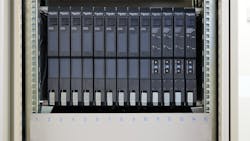A distributed control system (DCS) – the central brain controlling complex processes in energy-intensive, process-heavy industrial facilities – is vital to the continued, efficient, and profitable operation of the businesses that rely on them. Many systems in use today are at or near end-of-life. Yet, if you asked plant managers and operators if they’re looking forward to replacing their obsolete system with a more capable and user-friendly version, I suspect many of them would hesitate before saying yes.
That’s not because they don’t want better efficiency, ease of use, security, and features with a modern DCS. More likely, it’s because process control professionals are concerned about costs and risks associated with an entirely new system or even a phased upgrade.
Time is money
However, pushing the upgrade decision too far into the future only delays the inevitable and potentially introduces additional, preventable threats to operational continuity. Outdated components become progressively more difficult (and expensive) to maintain, leading to the increased possibility of a catastrophic failure that can bring production to a grinding halt. Also, unsupported or discontinued legacy platforms that are incompatible with the latest technology are often more difficult and
Asking the right questions is the key to success
Companies must assess all their options, whether for a phased-in distributed control system update, a full replacement, or to remain with their existing vendor. The main priority should always be to minimize the risks of system migration and remove any guesswork by defining your DCS migration and upgrade strategy before control system problems crop up. Here are five essential questions you should ask yourself to get the process started:
- System support: What level of support can my current vendor provide going forward? For instance, is the next end-of-life occurrence a near-term event, and how committed is the vendor to providing immediate service and long-term system maintenance?
- Capital and operating expenses: Does my maintenance personnel spend more time and money on repairs and restarts than process improvements? Evaluate the cost efficiency of modern systems and the value growth potential of improved operational efficiency and reduced downtime for your operations.
- Labor commitments: What labor costs are involved in expense and time associated with migration, and what migration tools and services are available to lower them? Human intervention will always be needed, whether from on-site staff or external resources, and evaluating which upgrade solutions reduce the total labor investment should be in any decision mix.
- Continuity and downtime: What are my critical drivers for migrating to a new DCS platform? Factors include uptime, improved process efficiency, advanced system features, and capability, plus ease-of-use, to name a few. Quantify and prioritize yours to ensure potential upgrade solutions meet all your needs.
- Upgradability and scalability: Will an upgraded system be more sustainable, and can it adapt easily and affordably to change, with attributes such as a future-proof design and a repurposing of used parts? System adaptability is key to lowering the total cost of ownership and should be evaluated along with other performance criteria.
With the five questions and your plan in place, selecting a partner with experience and proven solutions to fully support your migration and ongoing system maintenance is vital for long-term success. Schneider Electric’s DCS migration and upgrade programs, together with EcoStruxure™ Foxboro™ DCS, address the distributed control system challenges in a variety of ways.
- Future-proof – the latest electronics form factor aligns with future technology advancements and are designed to be adaptable as business, and operational needs evolve. Dedicated service locations worldwide can provide prompt, expert repair and maintenance services.
- Cost-efficient – the migration process can begin at any stage, replacing existing DCS infrastructure only when needed and solutions customized for each facility’s requirements.
- Limited downtime – plug-in migration solutions, hot cutovers, complete transfer of existing control schemes and databases, plus the extensive reuse of existing wiring help maintain the uptime of critical assets while lowering risk.
- Adaptable and scalable – tailor modern electronics to an existing system’s form factor without expanding the rack room/control room footprint. At the same time, all replacement parts are fully warrantied and maintained going forward.
Find an experienced distributed control system (DCS) partner with the right solution
Upgrading your critical process control functions with a cutting-edge system is a more comprehensive and cost-effective modernization step you take. Doing this will help protect your plant’s operational integrity, gain better functional insight into your processes, and adapt easily and affordably to change.
Though this process seems daunting, asking the right questions and choosing a migration services provider with the technology, solutions, experience, and flexibility to do the job right is fundamental to ensuring a successful upgrade.
Learn more about our DCS Migration and Upgrade Solutions and discover how a next-generation EcoStruxure Foxboro DCS can help you secure your future.

